| Listing 1 - 10 of 27 | << page >> |
Sort by
|
Book
ISBN: 1552504840 9786612953422 1282953427 1280010894 9786613512451 1849806721 Year: 2010 Publisher: Cheltenham, U.K. : Edward Elgar Pub.,
Abstract | Keywords | Export | Availability | Bookmark
 Loading...
Loading...Choose an application
- Reference Manager
- EndNote
- RefWorks (Direct export to RefWorks)
This book is about innovation strategies for a global economy, their development, implementation, measurement and management.
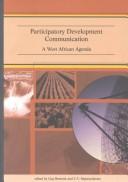
ISBN: 0889368023 1552503062 9786611974244 1281974242 9839054163 9789839054163 9781552503065 9780889368026 9781281974242 6611974245 Year: 1996 Publisher: Ottawa : Penang : International Development Research Centre ; Southbound,
Abstract | Keywords | Export | Availability | Bookmark
 Loading...
Loading...Choose an application
- Reference Manager
- EndNote
- RefWorks (Direct export to RefWorks)
Two years ago, the International Development Research Centre created CIME, a development communication program that reflects the interrelations between Communication at the grassroots level, the exchange of Information, two-way Media, and nonformal Education. This book presents the conceptual framework that led to the articulation of the CIME program. It explains in detail how the program was formulated, with references to the recommendations of a meeting of Central and West African NGOs held in Burkina Faso in November 1994. It also draws from the recommendations of a February 1995 meeting in Canada, attended by Canadian experts in development communication and representatives of West African NGOs taking part in the program. This book presents valuable information on the use of participatory communication for nonformal education, on the specific needs of women and young girls, and on the roles they can play as communicators within their community.
Communication in economic development --- Economic development --- Women in development --- Effect of education on. --- Citizen participation. --- Development and women --- GAD (Gender and development) --- Gender and development --- WAD (Women and development) --- WID (Women in development) --- Women and development --- Communication --- Communication in education. --- Non-formal education. --- Women --- Communication. --- Informal education --- Informal learning --- Nonformal education --- Adult education --- Educational innovations --- Occupational training --- Gap years --- Prior learning --- Education --- Communication, Primitive --- Mass communication --- Sociology --- Citizen participation --- E-books
Book
ISBN: 0889368090 1552503216 9786612054891 1282054899 9781552503218 9780889368095 Year: 1996 Publisher: Ottawa : International Development Research Centre,
Abstract | Keywords | Export | Availability | Bookmark
 Loading...
Loading...Choose an application
- Reference Manager
- EndNote
- RefWorks (Direct export to RefWorks)
Telecommunication --- International cooperation. --- Electric communication --- Mass communication --- Telecom --- Telecommunication industry --- Telecommunications --- International cooperation in telecommunication --- Communication --- Information theory --- Telecommuting --- International cooperation --- E-books
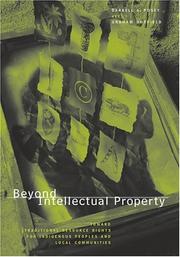
ISBN: 088936799X 1552500551 9781552500552 9780889367999 1280717416 9786610717415 9781280717413 6610717419 Year: 1996 Publisher: Ottawa : International Development Research Centre,
Abstract | Keywords | Export | Availability | Bookmark
 Loading...
Loading...Choose an application
- Reference Manager
- EndNote
- RefWorks (Direct export to RefWorks)
In Beyond Intellectual Property, authors Darrell A. Posey and Graham Dutfield listen and respond to this voice. They offer sound and reasonable advice on how indigenous peoples and local communities worldwide should approach and deal with the myriad of issues surrounding intellectual property and traditional resource rights. For indigenous peoples' groups, activists and policymakers in intellectual property, and all those concerned with the preservation of our planet's biological and cultural diversity, Beyond Intellectual Property provides an invaluable and eye-opening look into one of the mo
Sociology of minorities --- Industrial and intellectual property --- Cultural property --- Ethnoscience. --- Indigenous peoples --- Intellectual property. --- Protection --- Law and legislation. --- Legal status, laws, etc. --- Ethnoscience --- Intellectual property --- RBINS-OTHER --- IP (Intellectual property) --- Proprietary rights --- Rights, Proprietary --- Intangible property --- Indigenous knowledge systems --- Traditional knowledge systems (Ethnology) --- Ethnology --- Science --- Cultural heritage --- Cultural patrimony --- Cultural resources --- Heritage property --- National heritage --- National patrimony --- National treasure --- Patrimony, Cultural --- Treasure, National --- Property --- World Heritage areas --- Protection&delete& --- Law and legislation --- Legal status, laws, etc --- E-books --- Ethnobiology. --- Folk biology --- Folkbiology --- Traditional biology --- Biology, Economic --- Cultural property, Protection of --- Cultural resources management --- Cultural policy --- Historic preservation --- Protection. --- Ethnobiology --- Government policy

ISBN: 8186706674 8186706666 1552500187 9786610717286 1280717289 9781552500187 9788186706664 9788186706671 Year: 2003 Publisher: Ottawa : New Delhi : International Development Research Centre ; Kali for Women,
Abstract | Keywords | Export | Availability | Bookmark
 Loading...
Loading...Choose an application
- Reference Manager
- EndNote
- RefWorks (Direct export to RefWorks)
Contributed articles on women employees in economic development process in South Asia.
Sociology of the family. Sociology of sexuality --- Economic policy and planning (general) --- South Asia --- Women in economic development --- Women employees --- Female employees --- Women workers --- Working women --- Workingwomen --- Employees --- Economic development --- Economic conditions. --- Women --- Sex discrimination against women --- Man-woman relationships --- Labor market --- Household surveys --- Gender mainstreaming --- Analysis, Gender-based --- GBA (Gender-based analysis) --- Gender-based analysis --- Gender mainstreaming in biodiversity conservation --- Mainstreaming, Gender --- Social sciences --- Sex discrimination --- Surveys, Household --- Surveys --- Census --- Market, Labor --- Supply and demand for labor --- Markets --- Female-male relationships --- Male-female relationships --- Men --- Men-women relationships --- Relationships, Man-woman --- Woman-man relationships --- Women-men relationships --- Interpersonal relations --- Mate selection --- Discrimination against women --- Subordination of women --- Women, Discrimination against --- Feminism --- Women's rights --- Male domination (Social structure) --- Social conditions --- Methodology --- Supply and demand --- Relations with women --- Relations with men --- Asia, South --- Asia, Southern --- Indian Sub-continent --- Indian Subcontinent --- Southern Asia --- Orient --- Social conditions. --- Economic policy. --- E-books
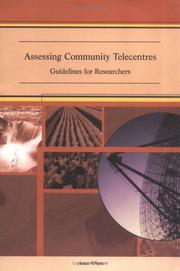
ISBN: 1280849924 9786610849925 1552502635 088936916X 9780889369160 9781552502631 9781280849923 6610849927 Year: 2000 Publisher: Ottawa : International Development Research Centre,
Abstract | Keywords | Export | Availability | Bookmark
 Loading...
Loading...Choose an application
- Reference Manager
- EndNote
- RefWorks (Direct export to RefWorks)
Telephone, fax, email, Internet; telemedicine, distance education, news distribution, telecommuting: these are some of the services offered by the community telecentre. But do telecentres truly respond to the communication and information needs of the communities they are intended to serve? What impact do they have on social equity and economic development? As community telecentres become more commonplace across Africa and in other developing regions of the world, these questions take on an increasing urgency. This guidebook will assist researchers as they assess and evaluate the role and impact of community telecentres. It provides an introduction to some of the key research issues, a framework for telecentre evaluation, and an impetus for research teams to share ideas, instruments, and methods. Assessing Community Telecentres will interest researchers, practitioners, and academics in information science, communications, international development, and evaluation, including telecentre operators, telecentre managers, and community leaders.
Telecommuting centers --- Information services --- Data collection services --- Information brokers --- Information centers --- Information science service organizations --- Information service providers --- Providers of information services --- Information retrieval --- Information science --- Documentation --- Research --- Electronic cottages --- Telecottages --- Telework hubs --- Business parks --- E-books
Book
ISBN: 128197420X 9786611974206 1552502643 9781552502648 0889367892 9780889367890 Year: 1995 Publisher: Ottawa : International Development Research Centre,
Abstract | Keywords | Export | Availability | Bookmark
 Loading...
Loading...Choose an application
- Reference Manager
- EndNote
- RefWorks (Direct export to RefWorks)
Agricultural biotechnology --- Agro-biotechnology --- Biotechnology --- Economic aspects --- Environmental aspects --- Evaluation --- E-books
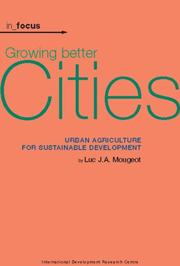
ISBN: 1280718285 9786610718283 1552502422 9781552502426 9781552502266 1552502260 1552503283 Year: 2006 Publisher: Ottawa, Ont. : International Development Research Centre,
Abstract | Keywords | Export | Availability | Bookmark
 Loading...
Loading...Choose an application
- Reference Manager
- EndNote
- RefWorks (Direct export to RefWorks)
The United Nations predicts that over the next 25 years nearly all population growth will be in the cities of the developing world. At current rates, 60% of the world's total population will live in cities by 2030. As the cities grow, so does the number of urban poor. Unemployment, hunger, and malnutrition are commonplace. In the big city, most of any cash income the poor might bring home goes to feeding themselves and staying alive; any food that does not have to be bought is a bonus. As a result, more and more people are attempting to grow at least some of their own food to supplement poor d
Urban agriculture --- Sustainable development --- Urban farming --- Agriculture --- Land use, Urban --- City planning --- Agricultural assistance, Canadian --- Technical assistance, Canadian --- Canadian technical assistance --- Canadian agricultural assistance --- Urban land use --- Cities and towns --- Urban economics --- Urban policy --- Urban renewal --- International Development Research Centre (Canada) --- Canada. --- IDRC --- CIID --- C.I.I.D. --- I.D.R.C. --- International Development Research Centre --- Centre de recherches pour le développement international (Canada) --- Centro Internacional de Investigaciones para el Desarrollo (Canada) --- International Development Research Center (Canada) --- C.R.D.I. --- CRDI --- Markaz al-Buḥūth lil-Tanmiyah al-Dawlīyah (Canada) --- International Development Research Centre of Canada --- Centro Internacional de Investigación para el Desarrollo (Canada) --- CIID Canadá --- International Development and Research Center (Canada) --- Tỏ̂ chức nghiên cứu và phát triẻ̂n quó̂c té̂ của Canada --- CRDI Canada --- IDRC Canada --- Kanadyn Olon Ulsyn Khȯgzhliĭn Sudalgaany Tȯv --- Olon Ulsyn Khȯgzhliĭn Sudalgaany Tȯv (Canada) --- Centro de Investigaciones para el Desarrollo (Canada) --- Centro de Investigación para el Desarrollo (Canada) --- IDRC-CRDI --- Centro Internacional de Investigaciones para el Desarrollo de Canadá --- E-books --- Centre de recherche pour le développement international (Canada) --- Centre de recherche pour le développement international du Canada
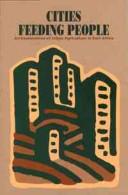
ISBN: 088936706X 1552501094 9781552501092 1280717572 9786610717576 Year: 1994 Publisher: Ottawa, Ont : International Development Research Centre,
Abstract | Keywords | Export | Availability | Bookmark
 Loading...
Loading...Choose an application
- Reference Manager
- EndNote
- RefWorks (Direct export to RefWorks)
Farming, food production, towns, Tanzania, Uganda, Kenya, Ethiopia.
Developing countries: agricultural and food problems --- East Africa --- Urban agriculture --- Food supply --- Food control --- Produce trade --- Agriculture --- Food security --- Single cell proteins --- Urban farming --- Land use, Urban --- E-books --- 911.3:63 --- Agricultural geography
Book
ISBN: 9781552503768 1552503763 9789588307213 1281162132 9786611162139 Year: 2008 Publisher: Ottawa, Ont. : Centro Internacional de Investigaciones para el Desarrollo,
Abstract | Keywords | Export | Availability | Bookmark
 Loading...
Loading...Choose an application
- Reference Manager
- EndNote
- RefWorks (Direct export to RefWorks)
Informalidad: escape y exclusion' explora este heterogeneo sector desde una variedad de perspectivas que van desde la preocupacion por la proteccion de los trabajadores a la productividad de las empresas y a los determinantes de la evasion fiscal. El informe toma y arroja mas luz sobre el caracter exclusionista de buena parte de la informalidad, que deja a los ciudadanos fuera de las instituciones formales. La discusion se mueve desde el analisis puramente economico de los incentivos microeconomicos, a la reflexion sobre lo adecuado del 'contrato social' una expresion sumaria por la forma como los ciudadanos de la region se relacionan con el Estado y con sus conciudadanos. El analisis ofrece recomendaciones que se extienden a lo largo de muchas dimensiones de la agenda de politica.
Women's rights --- Women --- Sex discrimination against women --- Sex discrimination in justice administration --- Justice, Administration of --- Discrimination against women --- Subordination of women --- Women, Discrimination against --- Feminism --- Sex discrimination --- Male domination (Social structure) --- Social conditions. --- Economic conditions.
| Listing 1 - 10 of 27 | << page >> |
Sort by
|

 Search
Search Feedback
Feedback About UniCat
About UniCat  Help
Help News
News